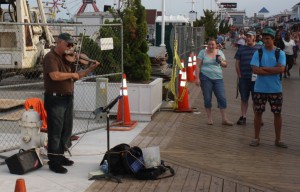
OCEAN CITY — The civil suit filed by a street performer last April challenging Ocean City’s newly implemented 30-foot rule on the Boardwalk was settled this week with a permanent injunction against the town from imposing the ordinance change and restitution to the plaintiff for his lost compensation.
Last April, the American Civil Liberties Union (ACLU) filed suit in federal court on behalf of violinist William Hassay, Jr. challenging the town’s noise ordinance changes on the Boardwalk the organization believes are an attempt to silence musicians. In the suit filed against the Mayor and Council and then-acting-Police Chief Michael Colbert, the ACLU alleged the enforcement of the town’s 30-foot noise ordinance on the Boardwalk infringed on Hassay’s, and other performers’ fundamental right under the First Amendment to engage in freedom of speech and expression in a public forum.
In July, U.S. District Court Judge Ellen Hollander issued an opinion granting a preliminary injunction and essentially prohibiting the town from enforcing the 30-foot rule for street performers on the Boardwalk until the case was resolved, which ultimately carried over for the rest of the summer season. With the preliminary injunction in place, all that was left to be resolved was the long-term future of the town of Ocean City’s 30-foot rule for Boardwalk street performers and what, if any, damages should be paid by the city to Hassay.
The settlement imposes a permanent injunction on Ocean City’s 30-foot sound restriction on the Boardwalk. The settlement also recognizes the significant loss of income that Hassay experienced during the time he could not perform his show on the Boardwalk by awarding him $21,000 in damages. In addition, the settlement includes reimbursement in the amount of $11,000 and awards Hassay $105,000 in attorney fees.
“Today, the First Amendment forecast for Ocean City looks bright and sunny,” said ACLU of Maryland Legal Director Deborah Jeon. “We are thrilled that musicians will no longer be silenced by Ocean City’s unconstitutional sound restriction and we are hopeful that the town will honor all performers’ free speech in the future.”
Jeon and the ACLU represented Hassay in the civil suit, along with lead counsel James W. Burke and attorneys Jonathan W. Guy, Kathleen A. Orr and Matthew Jeweler of the Washington, D.C. firm Orrick, Herrington and Sutcliffe, who worked on the case on a pro bono basis. For his part, Hassay was thrilled with the outcome in the suit.
“The First Amendment does have meaning in America and I am proud to be part of defending our free speech rights,” he said on Thursday. “I was so excited to be back on the Boardwalk again this summer, sharing the joy and romance of my violin with many visitors who had wondered where I was after not being able to play for over a year.”
In June, Judge Hollander heard oral evidence and testimony in the case. Those who testified included Hassay, other Boardwalk street performers who opposed the ordinance and an independent acoustical engineer, Gary Ehrlich, who had conducted a study of sound on the Boardwalk. According to Ehrlich’s testimony, most ambient sounds on the Boardwalk violated the town’s 30-foot ordinance, effectively prohibiting street performers from playing any music that anyone could hear.
In her opinion filed in July on the preliminary injunction, Judge Hollander said under any definition, the Ocean City Boardwalk qualifies as a public forum and Hassay’s music qualifies as a protected form of free speech.
